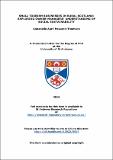Files in this item
Small tourism businesses in rural Scotland : exploring owner-managers' understandings of social sustainability
Item metadata
| dc.contributor.advisor | Hunter, Colin | |
| dc.contributor.advisor | Watts, David | |
| dc.contributor.author | McLaren-Thomson, Annabelle April | |
| dc.coverage.spatial | vii, 207, xxxv p. | en_US |
| dc.date.accessioned | 2016-12-01T09:54:50Z | |
| dc.date.available | 2016-12-01T09:54:50Z | |
| dc.date.issued | 2016 | |
| dc.identifier.uri | https://hdl.handle.net/10023/9907 | |
| dc.description.abstract | Tourism plays an ever more important role in Scotland’s rural economy. Although the tourism industry in rural areas is typically presented by small firms, knowledge of their role in sustainable rural development is limited. In particular, there has been little discussion about small tourism businesses’ (STB) contribution to social sustainability (SS). However, the literature suggests that STBs can contribute to SS through their relationship with the local community. While there is evidence to indicate that owner- managers’ (OM) views and beliefs relate to their business’ relationship with the local community, this aspect has received little attention by STB scholars to date. This thesis explores how STB OMs’ views of their business’ local community and its relationship with it can contribute to developing a better understanding of STBs’ role in SS. The research is informed by an interpretive-constructionist paradigm, and seeks to examine OMs’ views from a different angle. Semi-structured interviews were conducted with 26 OMs of small accommodation businesses across 19 villages and towns in three rural areas in Scotland. These were specifically selected for their differences regarding the geographic, economic and policy environment. Participants’ responses were analysed inductively and deductively to explore differences in their views, and to examine how their understandings reflect the current conceptualisation of lifestyle and profit oriented STB OMs. The results showed that the bifurcated conceptualisation of OMs was unsuitable for addressing the research aim. An inductive threefold typology of OMs emerged based on their views of their business’ local community and its relationship with it. Notably, the typology revealed additional and critical differences in OMs’ understandings to those that emerged from the deductive analysis of lifestyle and profit oriented OMs’ views. The differences revealed by the new typology have implications for STBs’ potential to contribute to SS locally and in the wider area. | en_US |
| dc.language.iso | en | en_US |
| dc.publisher | University of St Andrews | |
| dc.subject.lcc | G155.G72S3M6 | |
| dc.subject.lcsh | Rural tourism--Scotland | en |
| dc.subject.lcsh | Small business--Research--Scotland | en |
| dc.subject.lcsh | Sustainable tourism--Scotland | en |
| dc.title | Small tourism businesses in rural Scotland : exploring owner-managers' understandings of social sustainability | en_US |
| dc.type | Thesis | en_US |
| dc.type.qualificationlevel | Doctoral | en_US |
| dc.type.qualificationname | PhD Doctor of Philosophy | en_US |
| dc.publisher.institution | The University of St Andrews | en_US |
This item appears in the following Collection(s)
Items in the St Andrews Research Repository are protected by copyright, with all rights reserved, unless otherwise indicated.

